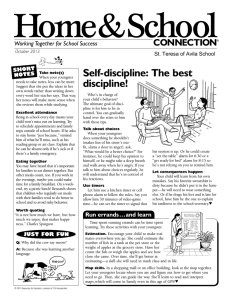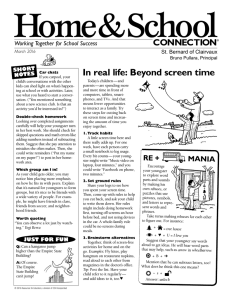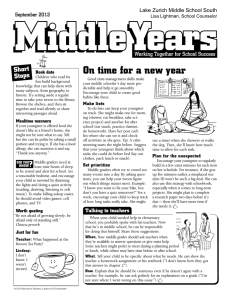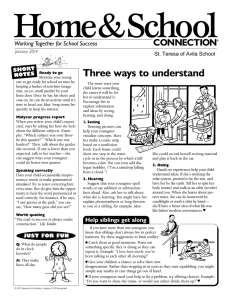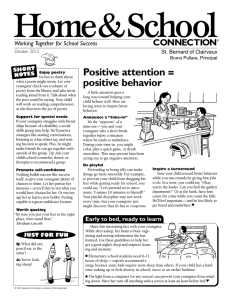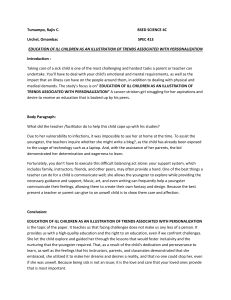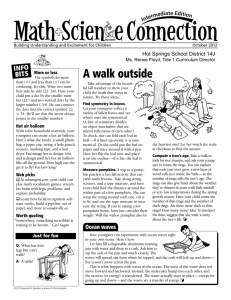Document 14344203
advertisement
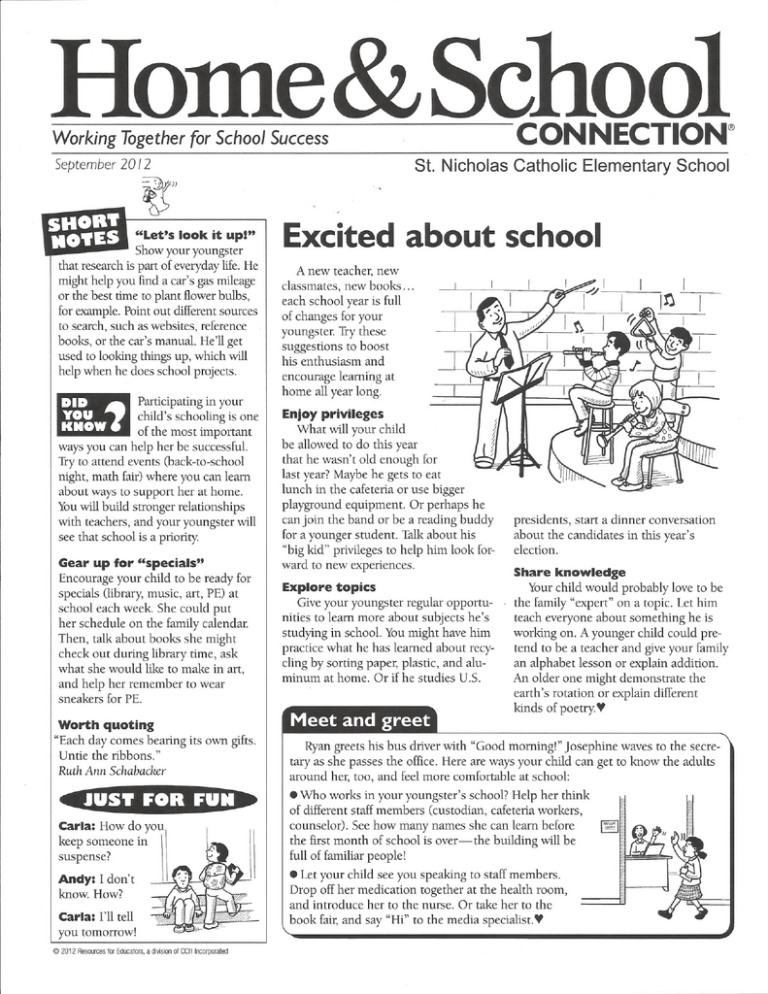
Working Together for School Success September 20 I 2 .. St. Nicholas Catholic Elementary School ~' "Let's look it upl" •• ~ •••• -. Show your youngster that research is part of everyday life. He might help you find a car's gas mileage or the best time to plant flower bulbs, for example. Point out different sources to search, such as websites, reference books, or the car's manual. He'll get used to looking things up, which will help when he does school projects. E Participating in your child's schooling is one of the most important ways you can help her be successful. Try to attend events (back-to-school night, math fair) where you can learn about ways to support her at home. You will build stronger relationships with teachers, and your youngster will see that school is a priority. Gear up for "specials" Encourage your child to be ready for specials (library, music, art, PE) at school each week. She could put her schedule on the family calendar. Then, talk about books she might check out during library time, ask what she would like to make in art, and help her remember to wear sneakers for PE. "Each day comes bearing its own gifts. Untie the ribbons." Ruth Ann Schabacker 1111I A new teacher, new classmates, new books ... each school year is full of changes for your youngster. Try these suggestions to boost his enthusiasm and encourage learning at home all year long. Enjoy privileges What will your child be allowed to do this year that he wasn't old enough for last year? Maybe he gets to eat lunch in the cafeteria or use bigger playground equipment. Or perhaps he can join the band or be a reading buddy for a younger student. Talk about his "big kid" privileges to help him look forward to new experiences. Explore topics Give your youngster regular opportunities to learn more about subjects he's studying in school. You might have him practice what he has learned about recycling by sorting paper, plastic, and aluminum at home. Or if he studies u.s. Meet and greet Worth quoting 4l1li Excited about school ¥-';' ill:_ Carla: How do you keep someone in suspense? Andy: I don't know. How? Carla: I'll tell you tomorrow! © 2012 Resources for Educators, a division of CCH Incorporated presidents, start a dinner conversation about the candidates in this year's election. Share knowledge Your child would probably love to be the family "expert" on a topic. Let him teach everyone about something he is working on. A younger child could pretend to be a teacher and give your family an alphabet lesson or explain addition. An older one might demonstrate the earth's rotation or explain different kinds of poetry." Ryan greets his bus driver with "Good morning!" Josephine waves to the secretary as she passes the office. Here are ways your child can get to know the adults around her, too, and feel more comfortable at school: • Who works in your youngster's school? Help her think of different staff members (custodian, cafeteria workers, counselor). See how many names she can learn before the first month of school is over-the building will be full of familiar people! • Let your child see you speaking to staff members. Drop off her medication together at the health room, and introduce her to the nurse. Or take her to the book fair, and say "Hi" to the media specialist." Home & Schoolcour.ecnor.r September 20 I 2 • Page 2 has had a similar experience. Ask that person to talk about her experience and how she handled it. For example, your youngster might tell her little brother, "I remember when my best friend changed schools. I was so sad. But we still spent time together after school. " A caring family A supportive family can give your youngster confidence and teach her to care about others. Suggest that family members try these ideas to show one another that they care. Highlight good news. Let your child write "Family News" on a strip of paper and tack it to a bulletin board. When something good happens (her big sister runs a SK, you get a new job), have her post it on the board. Encourage everyone to add a comment to each news item. ("Way to go, Mom!") Build each other up. When a family member is disappointed or frustrated, chances are someone in your house r;!" ~~p ~tJ ~~ .!;1.. _-- _"!IIII~IIfI~~'1'2 • .::':: ~.,. ~~ Make a boar d game This colorful board game is fun to make--and can help your youngster work on skills. First, have him assign a color of construction paper to each subject (language arts, math, science, social studies). Then, your child can cut six squares from each color and glue them on a poster board into a game-board pattern. Suggest that he add a "start" and a "finish" line. Next, help him think of a fun activity to write on each block. For math, he might put, "Make up a math problem about your favorite snack." A language arts block could say, "Write a silly sentence that has five words." To play, take turns rolling a die. Using a game token, move the number of blocks shown, and do what's written on the one you land on. The first person to the finish line (on an exact roll) wins .• OUR PURPOSE To provide busy parents with practical ideas that promote school success, parent involvement, and more effective parenting. Resources for Educators, a division of CCH Incorporated 128 N. Royal Avenue > Front Royal, VA 22630 540-636-4280 • rfecustomer@wolterskluwer.com www.rfeonline.com ISSN 1540-5621 © 2012 Resources for Educators, a division of CCH Incorporated ". Laugh together. Humor can relieve stress and strengthen bonds. Many families have a collection of "inside" jokes and stories. Tell them frequently, and share a good laugh . C'Remember when we found the cats on the top shelf of the pantry'")" . ~ Be a 'good hstener . Q: My son often doesn't-seem to listen when people talk. How can I help him become a better lis tener? A: A good listener has an easier time following instructions--an important skill at school and at home. Try simple games to boost your son's listening skills. You might hide a small object like a remote control and give him two- or three-step instructions to find it. For example, you could say, "Take three giant steps forward. Look behind the chair." Or during a walk, take turns giving each other instructions, such as "Turn around three times whenever you see a squirrel." Also, encourage your son to be an active listener. After you say something to him, ask him to repeat it in his own words. When he's at school, suggest that he repeat the teacher's directions in his head ("We're supposed to do the oddnumbered problems") .• Talking about money My kids were always asking to buy things such as dress-up shoes or new games. They didn't seem to understand that these items weren't in our budget. I wanted them to learn about how we spend our money--and that it is limited. So I got a spiral notebook and labeled it "Family Spending Journal." I explained that for two weeks, everyone would keep track of what they spent money on. I listed items like my subway fare, the electric bill, and the taxes taken out of my paycheck. The children wrote down expenses such as school lunch, soccer cleats, and field trip fees. After a few days, they were surprised by how many things we needed money for. Our kids had no idea, for example, that we paid for taxes on our income, several types of insurance, and membership in our homeowners' association. Sometimes they still ask to buy too many things at the store, but when I say no, at least they understand why..
